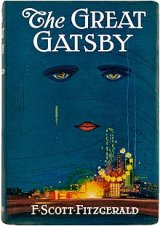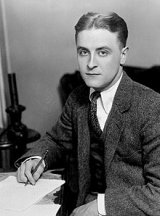The Great Gatsby Page #7
The Great Gatsby is a 1925 novel by American writer F. Scott Fitzgerald. Set in the Jazz Age on Long Island, near New York City, the novel depicts first-person narrator Nick Carraway's interactions with mysterious millionaire Jay Gatsby and Gatsby's obsession to reunite with his former lover, Daisy Buchanan. The novel was inspired by a youthful romance Fitzgerald had with socialite Ginevra King, and the riotous parties he attended on Long Island's North Shore in 1922
At 158th Street the cab stopped at one slice in a long white cake of apartment-houses. Throwing a regal homecoming glance around the neighbourhood, Mrs. Wilson gathered up her dog and her other purchases, and went haughtily in. “I’m going to have the McKees come up,” she announced as we rose in the elevator. “And, of course, I got to call up my sister, too.” The apartment was on the top floor—a small living-room, a small dining-room, a small bedroom, and a bath. The living-room was crowded to the doors with a set of tapestried furniture entirely too large for it, so that to move about was to stumble continually over scenes of ladies swinging in the gardens of Versailles. The only picture was an over-enlarged photograph, apparently a hen sitting on a blurred rock. Looked at from a distance, however, the hen resolved itself into a bonnet, and the countenance of a stout old lady beamed down into the room. Several old copies of Town Tattle lay on the table together with a copy of Simon Called Peter, and some of the small scandal magazines of Broadway. Mrs. Wilson was first concerned with the dog. A reluctant elevator boy went for a box full of straw and some milk, to which he added on his own initiative a tin of large, hard dog biscuits—one of which decomposed apathetically in the saucer of milk all afternoon. Meanwhile Tom brought out a bottle of whisky from a locked bureau door. I have been drunk just twice in my life, and the second time was that afternoon; so everything that happened has a dim, hazy cast over it, although until after eight o’clock the apartment was full of cheerful sun. Sitting on Tom’s lap Mrs. Wilson called up several people on the telephone; then there were no cigarettes, and I went out to buy some at the drugstore on the corner. When I came back they had both disappeared, so I sat down discreetly in the living-room and read a chapter of Simon Called Peter—either it was terrible stuff or the whisky distorted things, because it didn’t make any sense to me. Just as Tom and Myrtle (after the first drink Mrs. Wilson and I called each other by our first names) reappeared, company commenced to arrive at the apartment door. The sister, Catherine, was a slender, worldly girl of about thirty, with a solid, sticky bob of red hair, and a complexion powdered milky white. Her eyebrows had been plucked and then drawn on again at a more rakish angle, but the efforts of nature toward the restoration of the old alignment gave a blurred air to her face. When she moved about there was an incessant clicking as innumerable pottery bracelets jingled up and down upon her arms. She came in with such a proprietary haste, and looked around so possessively at the furniture that I wondered if she lived here. But when I asked her she laughed immoderately, repeated my question aloud, and told me she lived with a girl friend at a hotel. Mr. McKee was a pale, feminine man from the flat below. He had just shaved, for there was a white spot of lather on his cheekbone, and he was most respectful in his greeting to everyone in the room. He informed me that he was in the “artistic game,” and I gathered later that he was a photographer and had made the dim enlargement of Mrs. Wilson’s mother which hovered like an ectoplasm on the wall. His wife was shrill, languid, handsome, and horrible. She told me with pride that her husband had photographed her a hundred and twenty-seven times since they had been married. Mrs. Wilson had changed her costume some time before, and was now attired in an elaborate afternoon dress of cream-coloured chiffon, which gave out a continual rustle as she swept about the room. With the influence of the dress her personality had also undergone a change. The intense vitality that had been so remarkable in the garage was converted into impressive hauteur. Her laughter, her gestures, her assertions became more violently affected moment by moment, and as she expanded the room grew smaller around her, until she seemed to be revolving on a noisy, creaking pivot through the smoky air. “My dear,” she told her sister in a high, mincing shout, “most of these fellas will cheat you every time. All they think of is money. I had a woman up here last week to look at my feet, and when she gave me the bill you’d of thought she had my appendicitis out.” “What was the name of the woman?” asked Mrs. McKee. “Mrs. Eberhardt. She goes around looking at people’s feet in their own homes.” “I like your dress,” remarked Mrs. McKee, “I think it’s adorable.” Mrs. Wilson rejected the compliment by raising her eyebrow in disdain. “It’s just a crazy old thing,” she said. “I just slip it on sometimes when I don’t care what I look like.” “But it looks wonderful on you, if you know what I mean,” pursued Mrs. McKee. “If Chester could only get you in that pose I think he could make something of it.” We all looked in silence at Mrs. Wilson, who removed a strand of hair from over her eyes and looked back at us with a brilliant smile. Mr. McKee regarded her intently with his head on one side, and then moved his hand back and forth slowly in front of his face. “I should change the light,” he said after a moment. “I’d like to bring out the modelling of the features. And I’d try to get hold of all the back hair.” “I wouldn’t think of changing the light,” cried Mrs. McKee. “I think it’s—” Her husband said “Sh!” and we all looked at the subject again, whereupon Tom Buchanan yawned audibly and got to his feet. “You McKees have something to drink,” he said. “Get some more ice and mineral water, Myrtle, before everybody goes to sleep.” “I told that boy about the ice.” Myrtle raised her eyebrows in despair at the shiftlessness of the lower orders. “These people! You have to keep after them all the time.” She looked at me and laughed pointlessly. Then she flounced over to the dog, kissed it with ecstasy, and swept into the kitchen, implying that a dozen chefs awaited her orders there. “I’ve done some nice things out on Long Island,” asserted Mr. McKee. Tom looked at him blankly. “Two of them we have framed downstairs.” “Two what?” demanded Tom. “Two studies. One of them I call Montauk Point—The Gulls, and the other I call Montauk Point—The Sea.” The sister Catherine sat down beside me on the couch. “Do you live down on Long Island, too?” she inquired. “I live at West Egg.” “Really? I was down there at a party about a month ago. At a man named Gatsby’s. Do you know him?” “I live next door to him.” “Well, they say he’s a nephew or a cousin of Kaiser Wilhelm’s. That’s where all his money comes from.” “Really?” She nodded. “I’m scared of him. I’d hate to have him get anything on me.” This absorbing information about my neighbour was interrupted by Mrs. McKee’s pointing suddenly at Catherine: “Chester, I think you could do something with her,” she broke out, but Mr. McKee only nodded in a bored way, and turned his attention to Tom.
Translation
Translate and read this book in other languages:
Select another language:
- - Select -
- 简体中文 (Chinese - Simplified)
- 繁體中文 (Chinese - Traditional)
- Español (Spanish)
- Esperanto (Esperanto)
- 日本語 (Japanese)
- Português (Portuguese)
- Deutsch (German)
- العربية (Arabic)
- Français (French)
- Русский (Russian)
- ಕನ್ನಡ (Kannada)
- 한국어 (Korean)
- עברית (Hebrew)
- Gaeilge (Irish)
- Українська (Ukrainian)
- اردو (Urdu)
- Magyar (Hungarian)
- मानक हिन्दी (Hindi)
- Indonesia (Indonesian)
- Italiano (Italian)
- தமிழ் (Tamil)
- Türkçe (Turkish)
- తెలుగు (Telugu)
- ภาษาไทย (Thai)
- Tiếng Việt (Vietnamese)
- Čeština (Czech)
- Polski (Polish)
- Bahasa Indonesia (Indonesian)
- Românește (Romanian)
- Nederlands (Dutch)
- Ελληνικά (Greek)
- Latinum (Latin)
- Svenska (Swedish)
- Dansk (Danish)
- Suomi (Finnish)
- فارسی (Persian)
- ייִדיש (Yiddish)
- հայերեն (Armenian)
- Norsk (Norwegian)
- English (English)
Citation
Use the citation below to add this book to your bibliography:
Style:MLAChicagoAPA
"The Great Gatsby Books." Literature.com. STANDS4 LLC, 2025. Web. 23 Feb. 2025. <https://www.literature.com/book/the_great_gatsby_1598>.








Discuss this The Great Gatsby book with the community:
Report Comment
We're doing our best to make sure our content is useful, accurate and safe.
If by any chance you spot an inappropriate comment while navigating through our website please use this form to let us know, and we'll take care of it shortly.
Attachment
You need to be logged in to favorite.
Log In